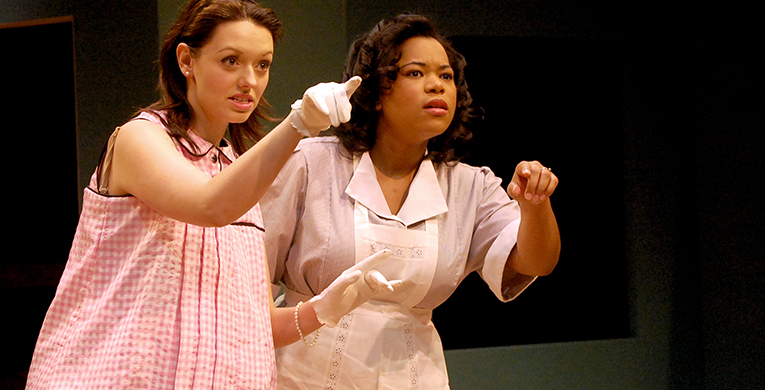
Susan Broadbridge / Printz
A theater is not the place where there is a lot of discussion about race, but “Clybourne Park” puts a spotlight on the issue.
Written in 2010 by Bruce Norris, “Clybourne Park” shows the reaction of when an African-American family, the Youngers, attempts to purchase a house in a white neighborhood in 1959 Chicago.
The play follows Bev and Russ, the couple selling the house, which the Youngers want to buy.
Bev and Russ want to sell to other residents in the community rather than the Younger family.
“In the rehearsal process, the first time we kind of went through these things it was pins and needles, it was an interesting process,” said Hillary Scales, first-year Master of Fine Arts (MFA) graduate student. “I think these issues are relevant and important, and I really think they will invoke change.”
Scales is playing the character of the African-American housekeeper, Francine, for Bev and Russ’ neighbors, the Linders. The Linders pull Francine and her husband Albert into the situation to give an African-American’s point of view.
Albert is played by Robert Isaac, a third year MFA graduate student and Chicago native. “I was born in ‘83, so I don’t know anything about that time period, but my mother does, and my grandmother does,” Isaac said. “So having them as a resource really helped in getting into that mode and that feel of what it was like back then.”
Back then the rule was severe economic and systematic inequality that was captured in the 1959 play “A Raisin in the Sun” by Lorraine Hansberry. “Clybourne Park” is a continuation of that story. In the former play, the Youngers attempt to move their way up the economic ladder and discover the hardships for minorities in America. The latter shows the repercussions of inequality, and that economic equality does not necessarily mean social equality.
“It’s race, and racism is something that we are often afraid to talk about,” said Rachel Swartz, third-year MFA graduate student playing Betsy Linder. “To just expose that we were afraid to talk about (it) was the most interesting thing, because unless you handle an issue and unless you can discuss an issue it will continue on and there will be no forward (progress).”
“Clybourne Park” will be showing from Feb. 20 to 23 and Feb. 26 until March 1 at 7:30 p.m. in the Tatum Theatre. There will be a pre-show talk on Feb. 26 at 6:30 p.m. as well as an afternoon showing Feb. 23 at 2 p.m.


























